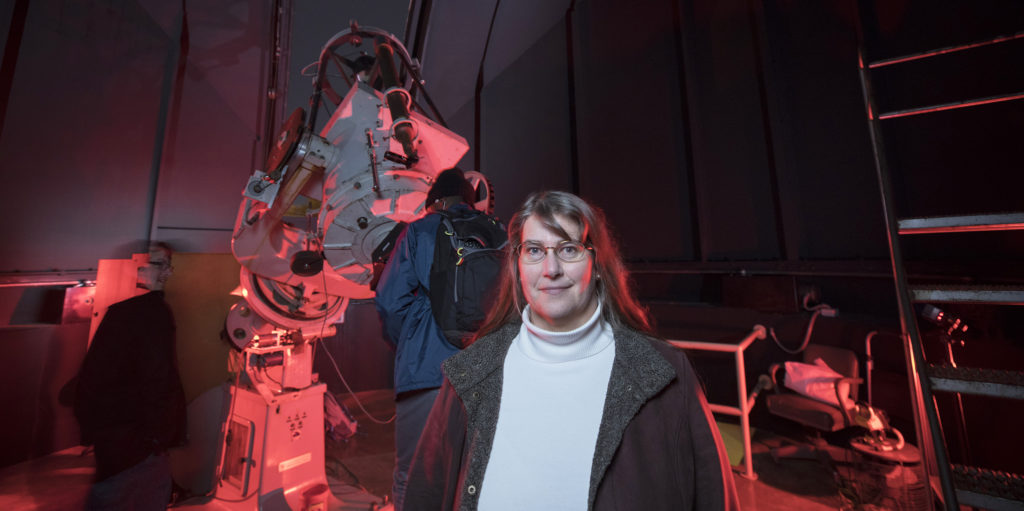Through her research and instruction, professor of physics and astronomy Robin Shelton discovers and shares knowledge about the galaxy that we call home.
Where did you earn degrees and what are your current responsibilities at UGA?
I earned by bachelor’s degree from the University of California, Berkeley, and my master’s and Ph.D. from the University of Wisconsin-Madison. I currently serve as professor of physics and astronomy in the Franklin College of Arts and Sciences and director of the UGA Observatory.
When did you come to UGA and what brought you here?
I came to UGA in 2003 to begin an assistant professor position in the department of physics and astronomy.
What are your favorite courses and why?
My favorite courses are the introductory courses on the solar system (Astronomy 1010 and 1110/1110H) and the introductory observing lab (Astronomy 1110L/2030L). Both courses are a little outside of my own area of concentration, so preparing for them gives me a chance to learn something new. The students find planets to be intrinsically interesting, which makes teaching the solar system courses fun for me. Similarly, students enjoy learning about the night sky and how to use the telescopes. I enjoy being a part of that.
What are some highlights of your career at UGA?
Last spring, I spent several months researching at the Technical University of Berlin in Germany as a Fulbright Scholar.
For most of my time here at UGA, I have had the good fortune to be working with bright, energetic and hardworking postdoctoral researchers, graduate students and undergraduate students.
Working with the observatory on the roof of the Physics Building; I started volunteering at public nights as soon as I arrived at UGA, then began to organize and expand the program, then learned from one of my colleagues, Dr. Scott Shaw, how to fix and maintain the main telescope, and later became the observatory director.
How do you describe the scope and impact of your research or scholarship to people outside of your field?
I explain my research to people outside of my field by saying that I study the gas between the stars in our galaxy, the Milky Way. By gas, I don’t mean gasoline, I mean that the material is gaseous, like air. Those statements might start a yawn in the backs of their heads, so I follow them up by saying that the stars in our galaxy were made from gas. Thus, essentially, our galaxy was made from gas (plus dark matter). Also, our galaxy is still growing because giant clouds of gas are falling into it.
The scope of my research is fairly wide — it includes studies of infalling clouds, the bubbles that are blown by exploding stars, a large bubble of hot gas surrounding the solar neighborhood, the hot gas that blankets the disk of the Milky Way and forms a buffer between our galaxy and intergalactic space, and X-ray signals from space, as well as computer simulations, and analyses of X-ray and UV observations of the gas in our galaxy.
The impact of my research is that it has moved forward our understanding of the galaxy in which we live.
How does your research or scholarship inspire your teaching, and vice versa?
Students greatly enjoy when I tell them about the newest astronomical discoveries. Some of that information is learned at scientific meetings that I attend as part of my research and scholarship duties.
Probably, my scientific presentations have benefited from practices that I learned while teaching. There is a lot of detail in science, and it can be fun to roll around in it. But as a result of practices I learned while teaching, I try to make my presentations give precedence to the big picture and the arc of my narrative or logic rather than leading with the details.
What do you hope students gain from their classroom experience with you?
In addition to learning the facts, I hope that students gain insight into the physical world from me.
Describe your ideal student.
Smart, hard-working, honest, fair, pleasant and excited about learning — not necessarily in that order.
Favorite place to be/thing to do on campus is…
I’ve enjoyed every visit that I have ever made to the Founders Memorial Garden.
Beyond the UGA campus, I like to…
… visit new places, go canoeing or kayaking.
The one UGA experience I will always remember will be…
Participating in UGA’s Lilly Teaching Fellows Program. Professor Susette Talarico was my faculty mentor and she did a wonderful job of it.
